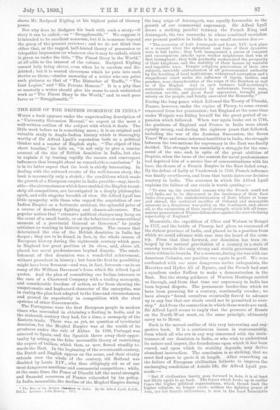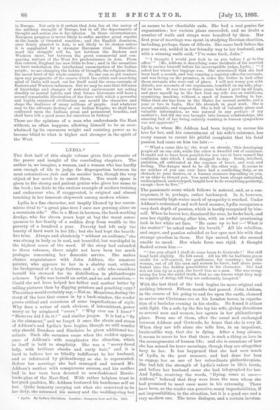THE RISE OF THE BRITISH DOMINION IN INDIA,* WHEN a
book appears under the unpretending description of a "University Extension Manual," we expect at the most a well-written outline of the subject with which it deals: The little work before us is something more ; it is an original and valuable study in Anglo-Indian history which is thoroughly worthy of Sir Alfred Lyall's reputation both as a political thinker and a master of English style. "The object of this short treatise," he tells us, "is not only to give a concise account of the rise of British dominion in India, but also to explain it by tracing rapidly the causes and convergent influences that brought about so remarkable a conclusion." It is in its latter aspect that the book is chiefly interesting. in dealing with the outward events of the well-known story, the book is necessarily only a sketch ; the conditions which made the growth of a European empire in India possible—nay, inevit- able—the circumstances which have enabled the English to out- strip all competitors, are investigated in a deeply philosophic spirit, and with singular breadth of view. Sir Alfred Lyall has little sympathy with those who regard the acquisition of our Indian Empire as a fortunate accident, the splendid prize of a course of desultory fighting and chance-adventure. The popular notion that " extensive political changes may hang on the event of u small battle, or on the behaviour at some critical moment of a provincial General or Governor," he justly criticises as wanting in historic proportion. The causes that determined the rise of the British dominion in India lay deeper ; they are to be found, in fact, in the whole course of European history during the eighteenth century which gave to England her great position at its close, and, above all, placed her naval predominance beyond dispute. The estab- lishment of that dominion was a wonderful achievement, without precedent in history ; but from the first its possibility might have been foreseen—and was, in fact, foreseen—as in an essay of Sir William Davenant's from which Sir Alfred Lyall quotes. And the plan of committing our Indian interests to the care of a Chartered Company with a trading monopoly, and considerable freedom of action, so far from showing the unsystematic and haphazard character of the enterprise, was in reality the plan best adapted to the time and circumstances, and proved its superiority in competition with the rival systems of other Governments. The Portuguese were the first European people in modern times who succeeded in obtaining a footing in India, and in the sixteenth century they had, for a time, a monopoly of the Eastern trade. There was, as yet, no question of territorial dominion, for the Moghul Empire was at the zenith of its greatness under the rale of Akbar. In 1580, Portugal was annexed to Spain, and the Spanish threw away their oppor- tunity by acting on the false mercantile theory of restricting the export of bullion, which then, as now, flowed steadily to- wards the East. In the beginning of the seventeenth century, the Dutch and English appear on the scene, and their rivalry extends over the whole of the century, till Holland was disabled by Louis XIV., who thus obligingly rid us of our most dangerous maritime and commercial competitors ; while, at the same time, the Peace of Utrecht left the naval strength and financial resources of France exhausted by his policy. In India, meanwhile, the decline of the Moghul Empire during * The Riso of tho British Densiarion in India. By Sir Alfred Lyall, K.O,B„ D.O.L. London John Murray. 1893. the long reign of Aurangzeb, was equally favourable to the growth of our commercial supremacy. Sir Alfred Lyall draws a striking parallel between the French King and Aurangzeb, the two monarchs to whose combined unwisdom our present position in India is in no small measure due:— " The accession of both Aurangzeb and Louis XIV. took place at a moment when the splendour and fame of their dynasties were in full lustre ; they both inaugurated a career of conquest and unscrupulous attacks upon weaker neighbours that was at first triumphant ; they both gradually undermined the prosperity of their kingdoms and the stability of their houses by wasteful and impolitic wars. Fanatic religious persecution of their own subjects, unwieldy centralisation of all governmental authority by the levelling of local institutions, widespread corruption and a magnificent court under the influence of bigots, lackies, and panders, were characteristics of the reign of the Bourbon as well as of the Moghul. And in each instance half-a-century's autocratic misrule, complicated by unfortunate foreign wars, sectarian revolts, and great fiscal oppression, brought great misery on the people, and fatally enervated the Monarchy."
During the long peace which followed the Treaty of Utrecht, France, however, under the regime of Fleury, to some extent recovered from her prostration ; but England at the same time under Walpole was fitting herself for the great period of ex- pansion which followed. When war again broke out in 1744, the positions of England and France in India were about equally strong, and during the eighteen years that followed, including the war of the Austrian Succession, the Seven Years' War, and some informal hostilities in India, the struggle between the two nations for supremacy in the East was finally decided. The struggle was essentially a struggle for the com- mand of the sea; and, in spite of the great abilities of Dupleix, when the issue of the contest for naval predominance had deprived him of a secure line of communications with his base, the dream of a French Empire in the East faded away. By the defeat of Lally at Vandewash in 1760, French influence was finally overthrown, and from that battle dates our decisive mastery in India. The sentence in which Sir Alfred Lyall explains the failure of our rivals is worth quoting :— "To sum up, the essential reasons why the French could not hold India are to be discovered in the insolvency of their East India Company, the maladministration of their affairs at home and abroad, the continual sacrifice of Colonial and mercantile interests to a disastrous war-policy on the Continent, and, above all, to the exhaustion of their naval strength, which left all trans- marine kossessions of France defenceless against the overwhelming superiority of England."
Meanwhile, the expedition of Clive and Watson to Bengal in 1757, and the battle of Plessey, had given us command of the richest province of India, and placed us in a position from which we could advance with ease into the heart of the coun- try. From that time forward, our dominion has been en- larged by the natural gravitation of a country in a state of anarchy towards the only strong and stable government that exists within its bounds. For a moment, during the war with our American Colonies, our position was again in peril. We were confronted with our most dangerous native antagonists, the Marattas and Ryder Ali of Mysore, and the French had sent a squadron under Suffren to make a demonstration in the East. But the strong guidance of Warren Hastings carried us through, and from that time our supremacy in India has been beyond dispute. The permanent border-line which we have been pursuing for a century, continually recedes ; we have always " found ourselves eventually forced to advance up to any line that our rivals could not be permitted to over- step." And from the connection in which these words are used, Sir Alfred Lyall seems to imply that the pressure of Russia on the North-West must, on the same principle, ultimately carry us to Herat.
Such is the merest outline of this very interesting and sug- gestive book. It is a continuous lesson in statesmanship, from which all who are in any way concerned with the main- tenance of our dominion in India, or who wish to understand its nature and import, the foundations upon which it has been reared, and upon which its stability depends, may derive abundant instruction. The conclusion is so striking, that we must find space to quote it at length. After remarking on the failure of European civilisation hitherto to impress the unchanging conditions of Asiatic life, Sir Alfred Lyall pro- ceeds :— " But if civilisation barely goes forward in Asia, it is at least not likely again to go back. The forces which broke up in earlier times the higher political organisations, which thrust back the higher religion, no longer exist ; neither the fighting power of Asia, nor her fanatic enthusiasm, is now in the least formidable
to Europe. Not only is it certain that Asia lies at the mercy of the military strength of Europe, but in all the departments of thought and action she is far inferior. In these circumstances, European progress is never likely to suffer another great repulse at the hands of Oriental reaction ; and the English dominion, once firmly planted in Asia, is not likely to be shaken unless it is supplanted by a stronger European rival. Hencefor- ward the struggle will be, not between the Eastern and Western races, but between the great commercial and con- quering nations of the West for predominance in Asia. From this contest, England has now little to fear ; and in the meantime we have undertaken the intellectual emancipation of the Indian people ; we are changing the habits of thought, the religious ideas, the moral level of the whole country. No one can as yet venture upon any prognostic of the course which the subtle and searching mind of India will mark out for itself amid the cross-currents of Eastern and Western influences. But we may be sure that diffusion of knowledge and changes of material environment are acting steadily on mental habits, and that future historians will have a second remarkable illustration of the force with which a powerful and highly organised civilisation can mould the character and shape the destinies of many millions of people. And whatever may be the ultimate destiny of our Indian Empire, we shall have conferred upon the Indians great and permanent benefits, and shall have left a good name for ourselves in history."
Those are the opinions of a man who understands the East without, as often happens, allowing himself to be so over- whelmed by its enormous weight and resisting power as to become blind to what is higher and stronger in the spirit of the West.



































 Previous page
Previous page